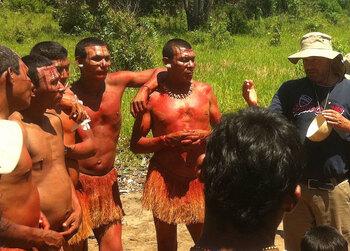Context
According to the UN Refugee Agency (UNHCR), around 5.7 million people in Colombia have been forcibly driven from their traditional lands since the mid-1980s and as such are classified as internally displaced persons (IDPs). This is the result of decades of armed conflict between the state and various illegal armed groups, drug producers and smugglers. Rural farming groups, indigenous peoples and the Afro-Colombian population have been disproportionately affected by these problems, since they often live in the remote conflict regions. Since 2011, legislation has been in place to enable the collective reintegration or resettlement and compensation of internally displaced persons. However, local authorities are in many cases unable to handle the task of implementing agreed measures for compensation and collective resettlement. Resettled IDPs often face discrimination in their new communities from long-established residents. Neither the new arrivals nor the established inhabitants have much prospect of finding a job and starting a new life. Poor provision of state services and long distances from towns and cities makes it difficult for both groups to participate in adequate social and economic development.
Objective
The social and productive livelihoods of returning IDPs and host communities in selected regions are improved.
Approach
The project operates in the departments of Córdoba and Guaviare. It strengthens the capacities of government actors such as provincial and municipal administrations, the victim reparations authority UARIV, and also non-governmental organisations. The focus is on the needs of IDPs and on ways to improve their living conditions. The project supports its partners in developing capacities to involve the population and successfully attract limited government funding. It also helps them to integrate the topic into development plans and establish infrastructure.
The project supports measures to improve the food and income situation for IDPs, their economic independence and self-organisation. To facilitate their conflict-free integration into host communities, the project offers training on non-violent approaches to conflict resolution and organises activities to strengthen social cohesion.
In the Guaviare region the project supports the indigenous Jiw, Nukak and Sikuani groups, which until recently led nomadic lives. These groups were driven out of their traditional lands by left-wing guerrillas and by force resulting from illegal mining, drug cultivation, narcotics smuggling and the violence associated with these activities. As they are no longer able to pursue their traditional ways of life on the tracts of land allocated to them, they live in extreme hardship. Their existence as tribal communities is under threat. The project assists them by improving their housing and education for their children, and offers support for their traditional livelihoods of hunting, fishing and farming. In doing so, it works closely with experts who have known the tribal communities for a long time and enjoy their trust.
Results
In three municipalities in Córdoba the people now have access to clean drinking water again. A road has been repaired in the village of Villanueva and families have been provided with bicycles to enable children and young people to get to school faster. The school in Villanueva has been equipped with furniture and teaching materials.
The project has begun replacing Jiw and Nukak dwellings made only of stilts and plastic sheeting with simple wooden huts; it has also supplied hammocks, blankets, mosquito nets, canoes and fishing equipment to ten settlements. 35 family clans now live in sturdier accommodation and have significantly improved their ability to provide food for themselves.
